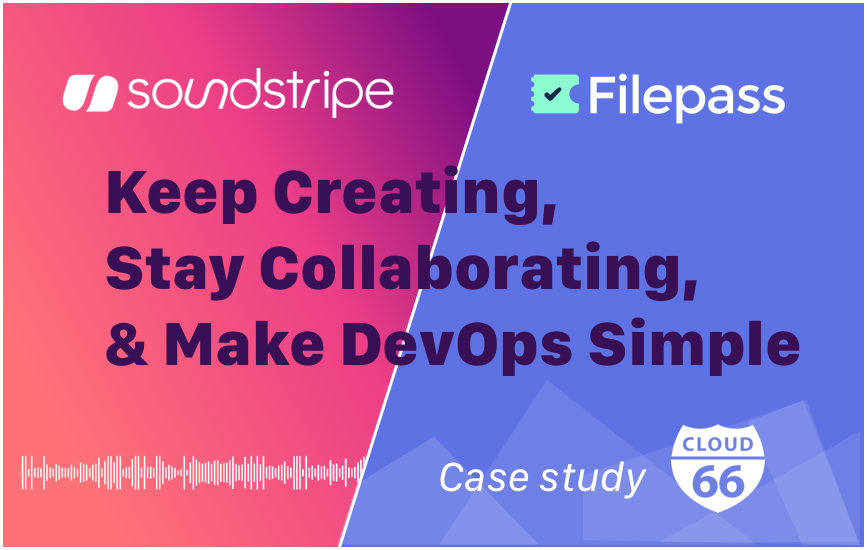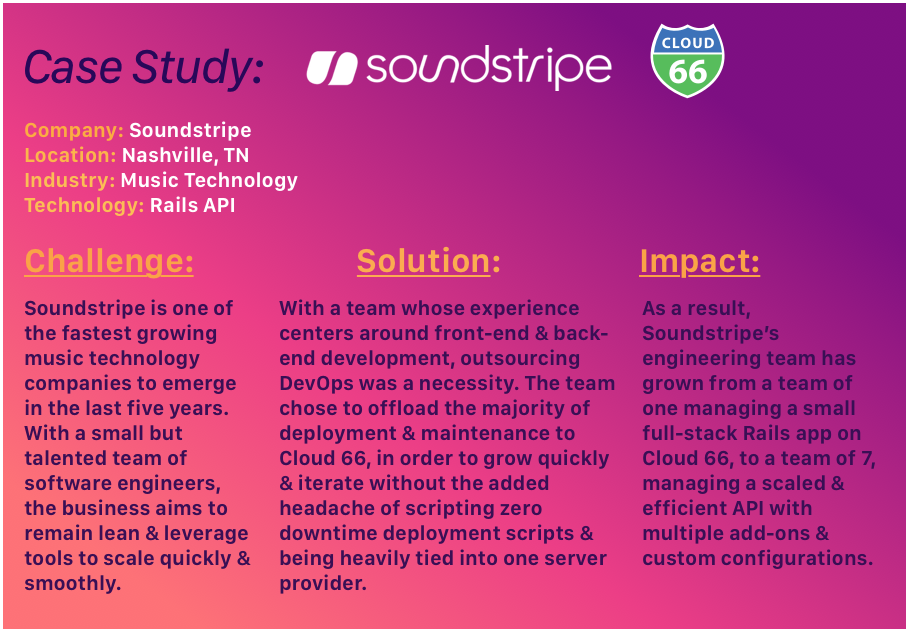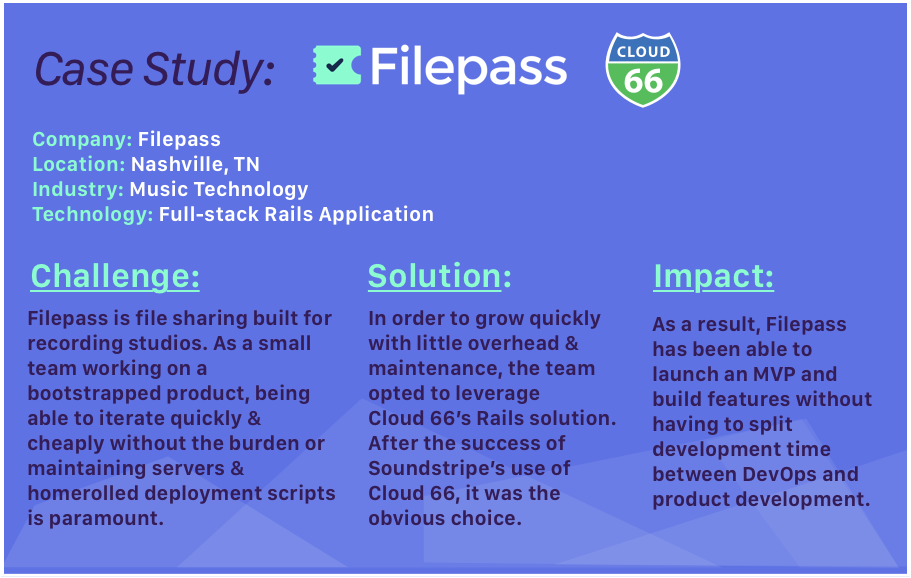Featuring Soundstripe and Filepass.
In this case study, I interviewed Trevor Hinesley about Soundstripe and Filepass, two startups that he co-founded, both of which run Rails applications on DigitalOcean with Cloud 66. Find out how these companies achieved DevOps best practices with our tools.

Soundstripe & Filepass Background:
Trevor Hinesley is a co-founder and CTO at Soundstripe and Filepass. Two brilliant startups that offer great tools for creatives in the video and music industries. Let’s look closely at both companies.
Soundstripe
Soundstripe is a royalty-free production music site made for video creators and designed with the user in mind. They allow their customers to have unlimited access to the highest quality music for their videos.
Who is using Soundstripe? YouTubers, advertisers, wedding filmmakers, content creators, nonprofits, podcasters, hobbyists, and more.
How it works? You can download high quality music via Soundstripe’s unlimited licensing model. You can browse via different categories, e.g. mood, genre, instruments, most popular songs, newly added songs, etc. When you find the tune you like, you can hit the “License” button and add it to your video.
Upon becoming a member, you will unlock unlimited licenses for every song in Soundstripe’s catalog. You will be able to curate playlists on demand and access new music added every week.
How can I join? There are two membership options: Standard and Premium. Depending on your needs, you can choose a monthly or annual Standard subscription, or the annual-only Premium subscription.
Join tens of thousands of members and keep creating.

Filepass
Filepass is an innovative file collaboration tool that is built for music professionals. Send streamable WAV files, collect timestamped revisions, and protect your files with a paywall.
How it works? You can send a direct link to clients, enabling them to easily collaborate on and receive music files. When clients are reviewing their music, they can leave time-stamped revisions. You will be provided with a checklist of revisions to complete, streamlining and simplifying music collaboration. Once the final product is ready, your client can pay to download their files.
How can I join? Check out Filepass and sign up with a 2-week free trial.

What was your journey to Cloud 66?
Having come from a startup and freelancing background, I’ve built many apps in Heroku, and experienced firsthand many of the pros and cons with growing an application on that platform. It’s a great tool to get something going, but long-term, the expenses add up, and you’re not able to easily customize configurations at a root level.
For instance, at Soundstripe, we do a lot of file processing. In my experience with Heroku, extensive file processing was a bit fragile, because their dynos might be accessing different temp directories due to its ephemeral filesystem. Basically, if you upload a file and it hits one dyno, then another dyno tries to process that file, it won’t have access to it because they don’t share directories. We use Cloud 66’s GlusterFS add-on at Soundstripe to have a shared temp directory across all of our app servers, and it’s worked very well for our needs.
In addition, being locked into Heroku’s infrastructure isn’t ideal. As prices are constantly dropping with cloud providers competing heavily, it’s nice to be able to switch providers. Cloud 66 makes this easier by being cloud provider agnostic, in that I can switch from using DigitalOcean to Amazon or Azure easily, or even split resources across them.
Can you give us an overview of your infrastructure set up?
Soundstripe is a team of over 40 people, 5 of which are software engineers, but we had humble beginnings like most startups. For the first year, I was the only engineer working on the product. For that reason, I needed a tool that could simplify DevOps and also grow with the business’ needs. Today, we have customers in over 130 countries, and Cloud 66 has been a vital part of keeping our team lean and efficient as we’ve grown over the last 3 years.
Filepass is a new venture of mine, and I’m the only engineer working on it. After having proved Cloud 66’s usefulness and scalability with Soundstripe, it was the obvious choice.
At the moment, both Soundstripe and Filepass are using Ruby on Rails for the back-end, DigitalOcean for servers, and PostgreSQL for the database. Soundstripe is an API, whereas Filepass is a full-stack Rails application. Both applications use NGINX for web servers and Redis for background processing. Soundstripe is also using GlusterFS for centralized temporary file storage, enabling easy file chunk uploading and the ability to process files from any application server regardless of which server(s) saved the uploaded chunks. HAProxy is also used for load balancing.
How did you eliminate the gaps between Dev and Ops?
Being a solo engineer and co-founder of a new startup, I was wearing many hats. I needed something that could share the load of getting the platform off the ground and keeping up, while also providing tools for expansion later on. I didn’t want to spend all of my time coding deployment schemes and adjusting infrastructure as we scaled.
Outside of being a powerful tool with solutions for basically every stage of growth, Cloud 66’s customer support has been one of the primary reasons it’s been so effective for both Soundstripe and Filepass. There are PaaS (Platform-as-a-Service) tools that have much less customizability and much less room for error than a product like Cloud 66 that have left me high and dry where support is concerned. DevOps is a complicated field, and with the ever-changing landscape of technology and tooling for it, there will always be bugs to fix and errors to correct, and without a knowledgeable and timely team of support engineers to help, it can be catastrophic when things go awry.
What are the benefits of using Cloud 66 - DevOps implementation?
The platform is great and the customer service is second to none in the field of DevOps. A nice perk that I didn’t plan on when I first started using Cloud 66, is the amount I’ve learned through the platform’s approach of “we’ll set some defaults for you, but you can customize them later.” I’ve actually gained a lot of knowledge about DevOps over the last few years of interacting with Cloud 66’s technology and their excellent support team. A great testament to this is Vic (Cloud 66’s CTO) stepping in to help when I have architectural questions about the platform. By slowly getting accustomed to editing the default configurations that Cloud 66 spins up for you, you’re able to learn nuances of DevOps and the platform as you go, instead of having to build everything from the ground up right out of the gate. This enables you to build MVPs (Minimum Viable Product) quicker, without having to worry about the details until it’s necessary.
What is your experience with deploying with Cloud 66?
So far it’s been great. When we started, we were a full-stack Rails application, but have since transformed out back-end into a Rails API. This transition was very easy with Cloud 66, and it has scaled nicely, going from an all-in-one-server setup to having a separate database (which we also later upgraded to a larger database seamlessly), adding a load balancer, multiple web servers, a Redis server, a GlusterFS server, verified database backups, etc. It has worked great for the life of our business, and I’m confident that will continue. When DigitalOcean had some datacenter issues, we were able to move our entire stack to a different datacenter fairly painlessly using Cloud 66’s migration guides. As we continue to scale, and the competitive landscape of server providers keeps driving costs down, keeping our deployment platform agnostic will continue to be a huge asset for us, enabling us to move our stacks to different providers with ease, saving us time, money, and maintenance overhead.
Similar to Soundstripe, Filepass does a lot of file processing when files are uploaded, and being able to scale that easily is paramount. As I referenced before, other platforms like Heroku make that a bit more difficult with their ephemeral filesystems. Also, I’ve seen the long-term benefits of Cloud 66 and am confident in the platform and its tooling.
Is there anything that you would like to add?
Honestly, I’m thankful that Cloud 66 exists. It’s enabled me to get two businesses off the ground in quick order, and it’s proven itself to be a worthwhile solution at each stage of growth. I’m excited to see how it continues to mature. I plan on being a satisfied customer far into the future!
Thank you, Trevor! It is a pleasure to work with Trevor Hinesley and two of his startups, Soundstripe and Filepass. Thank you, Trevor, for your kind words and for finding the time to chat with us about your experience with Cloud 66 and DevOps. It's always fantastic to discover all the unique ways in which our customers are using our products.
